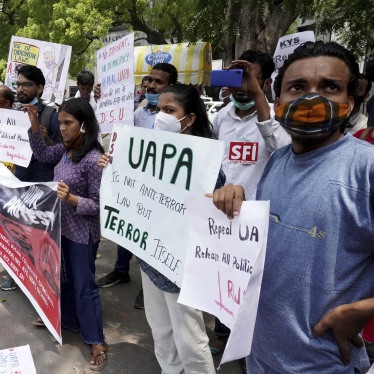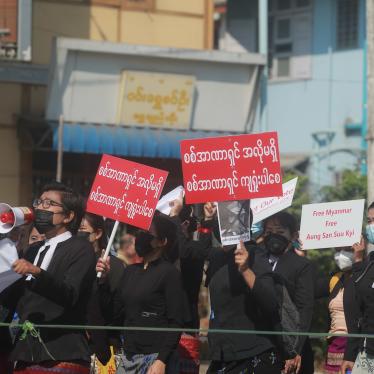(New York) - The Bangladesh government must urgently investigate and prosecute those responsible for increasing political and sectarian violence in the country, Human Rights Watch said today.
Bangladesh has been in the grip of severe political unrest since an August 21 grenade attack on a rally by the opposition Awami League Party. Eighteen people died in the attack. Many observers consider the attack to have been an assassination attempt on Sheikh Hasina Wajed, leader of the Awami League.
The attack on the opposition rally was the latest in a series of bomb attacks across Bangladesh. Ironically, the rally was being held to protest an earlier bomb attack on an opposition mayor in the north-eastern city of Sylhet. In May, Anwar Chowdhury, the British ambassador, was injured and three people died in a bombing apparently aimed at the ambassador in the same city.
The political opposition and some independent analysts allege that smaller coalition partners in the government have links with Islamic militants. The government, led by Prime Minister Khaleda Zia and her Bangladesh National Party (BNP), deny the claim.
“The BNP government must make, and be seen to be making, every effort to apprehend the perpetrators of these attacks,” said Brad Adams, executive director of Human Rights Watch’s Asia Division. “The government’s inaction in the face of a bombing campaign targeting the political opposition risks people taking the law into their own hands, which could lead to more violence.”
Human Rights Watch expressed concern about recent violence against the press and religious minorities. Journalists describe a pattern of intimidation and harassment of the popular press by those describing themselves as Islamists. Kamal Hossain of the Bengali language daily Ajker Kagoj became the third journalist to be murdered since January when he was killed after being kidnapped on August 22.
The highly regarded Bangla-language newspaper Prothom Alo has also reported daily threats by Islamist groups since it ran investigative reports revealing the training of militants in the Islamic seminaries of Chittagong district in the southeast of the country. Since the publication, threats have been made against the newspaper by, among others, members of the Islami Oikya Jote (Islamic United Front), a coalition member in the present government.
Human Rights Watch remains concerned about the role of two junior partners in the BNP-led coalition. Investigations conducted by Human Rights Watch indicate that, in addition to the strident attacks on the press, both the Jamaat-e-Islami and the Islami Oikya Jote have supported harassment and violence against both the Ahmadiyya Muslim sect and the Hindu minority in Bangladesh. The two orthodox Islamist parties seek to have the minority Ahmaddiya Muslim sect declared non-Muslim and their cadres have been responsible for several acts of violence against the group.
“If the Zia administration is committed to pluralism and human rights, then it needs to act with a sense of urgency to end this violence,” said Adams. “The BNP should not tolerate coalition partners who appear to fomenting religious and sectarian violence.”






